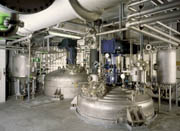Alberdingk Boley selected RHE Haendel Engineering GmbH & Co. KG and RHE America to design and supply the equipment for its new plant. RHE has designed and supplied most of the emulsion production trains —including raw material and finished good storage tank farms and buildings — to Alberdingk Boley during the last 30 years. RHE draws on both 40-plus years of experience designing emulsion manufacturing plants and specialized knowledge of reaction processes to prepare all engineering and design work from a minimal amount of information about the raw materials provided by Alberdingk Boley.
RHE designs and supplies a range of resin production plants with the following core principles in mind: safety; product quality; short batch times; and quick turnaround time.
Safety
Controlling the storage temperature of many of the liquid monomers (such as acrylics, styrene, vinyl acetate) is a critical safety issue. RHE includes automatic and continuous monitoring of the liquid monomer temperatures in the storage tanks, and also includes an external heat exchangers loop cooled with chilled water as part of the monomer storage system. Any increase in the liquid monomer temperature triggers automatic circulation of the monomer through the heat exchanger loop.Preventing runaway reactions in the monomer blending tank is another safety concern. RHE controls the temperature inside the monomer blending tank by continuously circulating cooling water through half coils on the outside of the vessel. If the temperature inside the monomer blending tank increases above a predetermined critical point, reaction inhibitor is automatically injected.
A continuous, online enthalpy measurement and temperature gradient system allows RHE to determine the exact reaction starting point of the polymerization reaction. If the reaction does not start at the expected time, the reactor is automatically shut down. Automatic shutdown means all raw material feeding is stopped, reactor heating is stopped, reactor cooling is started and alarms are triggered. After shutdown, the operator can sample the mixture in the reactor, determine the reason the reaction did not start as expected, and decide on the correct course of action.

Product Quality
Consistent product quality starts with consistent raw material addition. All tanks of the train are mounted on scales and the raw materials are added automatically by weight to ensure consistent reproducibility.
RHE also includes fully automatic process control schemes with all new plants. These control schemes include recipe management programs for the automatic processing of different types of formulations and reports outlining all events for each batch. This user-friendly control system ensures consistent product from batch to batch.
Short Batch Times
A custom-designed agitator with a variable speed drive is used to stir the reactor contents. This agitator displays efficient horizontal and vertical mixing and reduces the batch times because of both better raw material contact and faster heat transfer. Also, a controlled heating and cooling circuit was designed to maintain the preset temperature with an accuracy of plus or minus 1 degrees C. This tight control of the reactor temperature eliminates hot or cold spots inside the reactor and avoids temperature fluctuations.Minimal Turnaround Time
In the production of polymer emulsions, the turnaround time between batches is used to clean the reactor. Polymer emulsions tend to stick to all kinds of surfaces, particularly the inside of the reactor and the reactor agitator. RHE polishes all of the surfaces in contact with the product to mirror finish including the reactor internals and the agitator surfaces.
During the production of polymer emulsions, monomer vapors without inhibitor rise to the top of the reactor vessels. The typical reactor is insulated at the top, and as monomer vapors rise, they tend to polymerize and form a layer of polymer hanging down from the top of the reactor vessel. But rather than insulating the top of the reactor vessel, RHE cools the top of the reactor with water circulating through half pipe coils attached to the exterior of the reactor top. Therefore, the monomers rise to the top of the reactor, condense on its surface and flow back down into the reactants. This virtually eliminates the formation of a polymer layer on the interior of the reactor top, thereby reducing the time and effort needed to clean the reactor between batches.
For more information:
About Alberdingk BoleyFounded in 1828 as an oil mill factory for native oil seeds, Alberdingk Boley began manufacturing polymer emulsions in 1970, polyurethane emulsions in 1985, and adhesive emulsions in 1998. The company’s castor oil-extracting mill is the only one of its kind in Europe, and its linseed oils are experiencing a renaissance of sorts as a renewable raw material, especially in printing ink manufacturing.
For more information, visit www.alberdingk-boley.com.
About RHE Haendel Engineering GmbH & Co. KG
Since 1958, this company has specialized in the design, manufacture, supply and commissioning of chemical plants for solvent and waterborne synthetic resins, polymer emulsions, wax emulsions, and resin related products. The company supplies and sets up projects ranging in scope from revamps for improved plant efficiency to complete production training to Greenfield turnkey factories.
For more information, visit www.rhehaendel.de/ eng/index.html.
About RHE America
This company was formed as a partnership between RHE Haendel Engineering GmbH & Co. KG and AMCEC, Inc., a designer and provider of turnkey solvent recovery systems for clients throughout North America and Mexico for the past 25 years. Combining years of chemical process knowledge and engineered system design experience, RHE America is able to provide a European technology that meets U.S. codes and standards.
For more information, visit www.rhe-america.com.